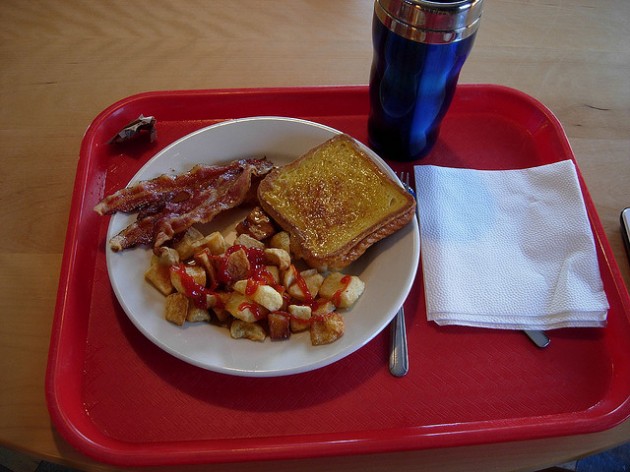I would venture a guess that the worst meal you have ever eaten was in a college dining hall. For me, it was Boston University’s famously awful quesadillas – I still don’t know how the school manages to make them both too dry and too greasy.
At best, lackluster college dining options are merely an annoying problem – particularly for a burgeoning foodie. But often, it’s more than that. For many college students, a huge majority of their food comes from a single place – Sodexo, perhaps, or Aramark. It can be difficult for these students to know if the food they’re eating is sustainable, or organic, or healthy. And even if schools make an effort to be transparent about its food, many students still want other options.
Student-run food cooperatives are one possible solution. Many readers will be familiar with the idea of a food co-op; basically, it’s a grocery store or restaurant that’s run democratically by its own patrons. Co-ops don’t just give students the opportunity to run their own business, though. Megan Meo – a Hampshire College student and co-op worker – says the benefits are “countless.”
“Food co-ops typically make nourishing and sustainable food more accessible,” Meo told me, in an interview via email. “This ‘real’ food becomes more accessible not only from being sold on campus but also through educational programs put on by the co-ops members. Cooperatives have a goal of educating [their] members and customers to help them become more conscious consumers. For those students who are worker-members at the cooperatives, they are able to receive hands on experience with social entrepreneurship and management.”
Meo should know. As the North East Regional Director of the Cooperative Food Empowerment Directive (CoFED), she helps college students across the country form their own co-ops – a challenging pursuit, to say the least. Right now, she’s working on setting up a second co-op at Hampshire. We asked her about this project, and more, after the jump.
PRK: What’s the benefit of joining CoFED for a student group that’s interested in starting a co-op?
MM: CoFed is able to help students feel less overwhelmed by the process of starting a food cooperative on their campus. The regional organizers provide students with the support they need by helping to keep them in the right direction, overcome any roadblocks, and answer any questions that may emerge. Students are able to access many online resources that CoFed offers such as sample business plans, financial plans, fundraising tools, etc. One of the most beneficial aspects of being connected with CoFed is the opportunity to network and communicate with other students working on similar projects or students involved in already operating food cooperatives. Students do not need to continuously be reinventing the wheel, instead they get to collaborate with students all across the nation to share ideas and resources to make their projects that much more possible.
PRK: Can you tell me a little bit about the regional project you’re working on now? What are some of the challenges you’re facing?
MM: I am involved in the start-up of a cooperative cafe on Hampshire Campus in Amherst, MA. We are in the process of creating plans to open a cafe in an underutilized building on campus. There are over 20 students who are part of this initiative, some who are in a social entrepreneurship class working on aspects of the planning for a class project. We want to create a community space that is supported by a cafe that allows all members of the Hampshire community to interact and collaborate.
One of our biggest obstacles at the moment is the fact that the schools food service provider Sodexo does not allow other food services to be open during hours when they sell food. We also are faced with the challenge of being students and only being able to dedicate so much time to this initiative.
PRK: Do you usually meet a lot of resistance from administrators?
MM: Many administrators are extremely supportive and excited about our project, however some members of the administration are hesitant to put such a big project in the hands of the students. Because students are so transient by nature, administrators are constantly aware of the possibility of not following through with student initiated projects.
PRK: How do you find time to balance all your co-op work with your classes and other activities? It all seems rather daunting.
MM: Hampshire’s unique approach to education allows me to be able to balance my co-op work with my classwork. Hampshire encourages a hands on education through independent studies and internships. My self designed concentration is Cooperative Entrepreneurship and Food systems. This semester all of my classes have some aspect of the cafe projects incorporated into its curriculum. Although the cafe project is such a big aspect of my academic career at the moment, it is easy to get carried away with all of the work needed to be done. In order to stay balanced and sane, I oftentimes have to remind myself to work on the project step by step and to be patient throughout the process and to allow myself time to focus on classwork. Other students working on a project that is not so incorporated into their academics will sometimes try to get academic credit for doing it as an independent study.
PRK: Similarly, how do students manage to raise all the money to get one of these off the ground?
MM: In the past, students have been able to raise money through school grants such as the Green Initiative Fund, outside grants, and donation and funding drives. UC Berkeley students were able to raise $91,000 through their school’s Green Initiative Fund.

